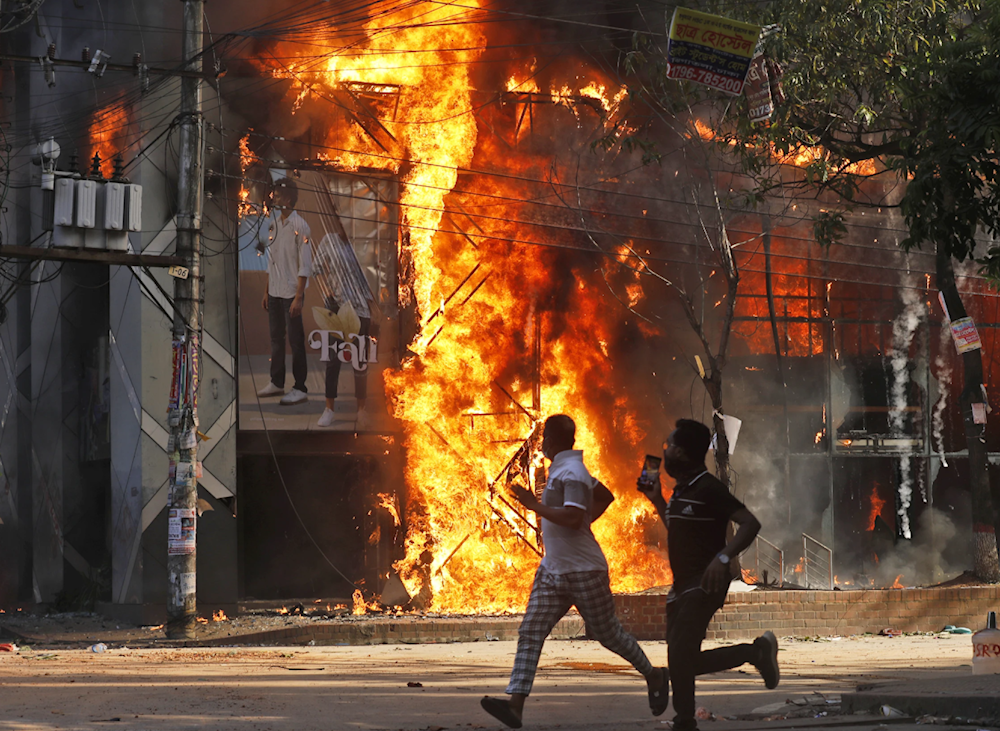Bangladesh president orders release of jailed ex-PM, protesters
Bangladesh's military says it would lift a curfew imposed to quash protests at dawn Tuesday.
-

Men run past a shopping center, which was set on fire by protesters during a rally against Prime Minister Sheikh Hasina and her government on August 4, 2024. (AP)
Bangladeshi President Mohammed Shahabuddin on Monday ordered the release of incarcerated former prime minister and major opposition leader Khaleda Zia, hours after her opponent Sheikh Hasina was deposed and the military gained control.
In a statement, the President's press staff stated that a conference convened by Shahabuddin "decided unanimously to free Bangladesh Nationalist Party (BNP) chairperson Begum Khaleda Zia immediately."
The conference was attended by Army Chief General Waker-Uz-Zaman, the heads of the Navy and Air Force, and prominent representatives from numerous opposition groups, including the BNP and Jamaat-e-Islami.
According to the statement, all those arrested during protests are also to be freed.
Hasina resigned and left the country on Monday, Reuters reported, after thousands of protesters stormed her official residence amid ongoing violent student-led protests that have killed at least 356 people since July.
Earlier Monday, Waker said on national television that Hasina had resigned and that the military would create a caretaker administration. "The meeting decided to form an interim government immediately," the broadcast revealed.
Zia, 78, is in terrible condition and confined to a hospital after being sentenced to 17 years in jail for corruption in 2018.
At least 93 people, including 14 police officers, were killed with over a thousand wounded on Sunday amid violent clashes between the police and anti-government demonstrators during nationwide protests demanding the resignation of Prime Minister Hasina, marking one of the deadliest demonstrations since they ignited in July.
The nationwide protests took place in 20 districts on Sunday against the ruling party, with law enforcement firing tear gas and stun grenades to disband the tens of thousands of demonstrations demanding Hasina resign following weeks of violent student-led anti-quota protests.
At least 56 people were killed Monday during the ensuing violence, mainly in Dhaka but also in other cities, police said, saying gangs had launched revenge attacks on Hasina's allies.
The latest violence took the total number of people killed since protests began in early July to at least 356, according to an AFP tally based on police, government officials, and doctors at hospitals.
Soldiers and police in several cases did not intervene to stem Sunday's protests, unlike during the past month of rallies that repeatedly ended in deadly crackdowns.
Bangladesh's military said it will remove a curfew imposed to quell protesters at daybreak Tuesday. "Offices, factories, schools, colleges... will be open" from 6:00 am Tuesday, according to a military statement
Why are they protesting?
Since July 1, thousands of Bangladeshis have been protesting the reinstatement of the quota system, which was abolished in 2018 since it was deemed unlawful but was restored on June 5.
With around 18 million young people in Bangladesh unemployed, according to government data, the reintroduction of the quota scheme has deeply frustrated graduates who are already facing a severe job crisis.
Last month, the government deployed police and paramilitary forces to contain the violence, but the unrest persisted. On July 19, the government imposed a curfew and brought in the army to curb the protests.
The quota system was originally implemented by Sheikh Mujibur Rahman, the founding leader of Bangladesh and father of Prime Minister Sheikh Hasina, as a reward for fighters who fought in Bangladesh's 1971 liberation war against Pakistan. In 1997, and again in 2010, the quotas were expanded to include the descendants of freedom fighters.
Students argued that the system was unfair and called for most government jobs to be awarded based on merit.
On July 21, the Supreme Court of Bangladesh significantly reduced the number of government jobs reserved for war veterans and their descendants, in a landmark decision following violent student protests that resulted in 155 deaths.
Shah Monjurul Hoque, a lawyer representing student groups, indicated that the court ruled that only 5% of government jobs will now be reserved for the children and grandchildren of those who fought for Bangladesh's independence from Pakistan in 1971, down from the previous 30% quota for this group.

 4 Min Read
4 Min Read








